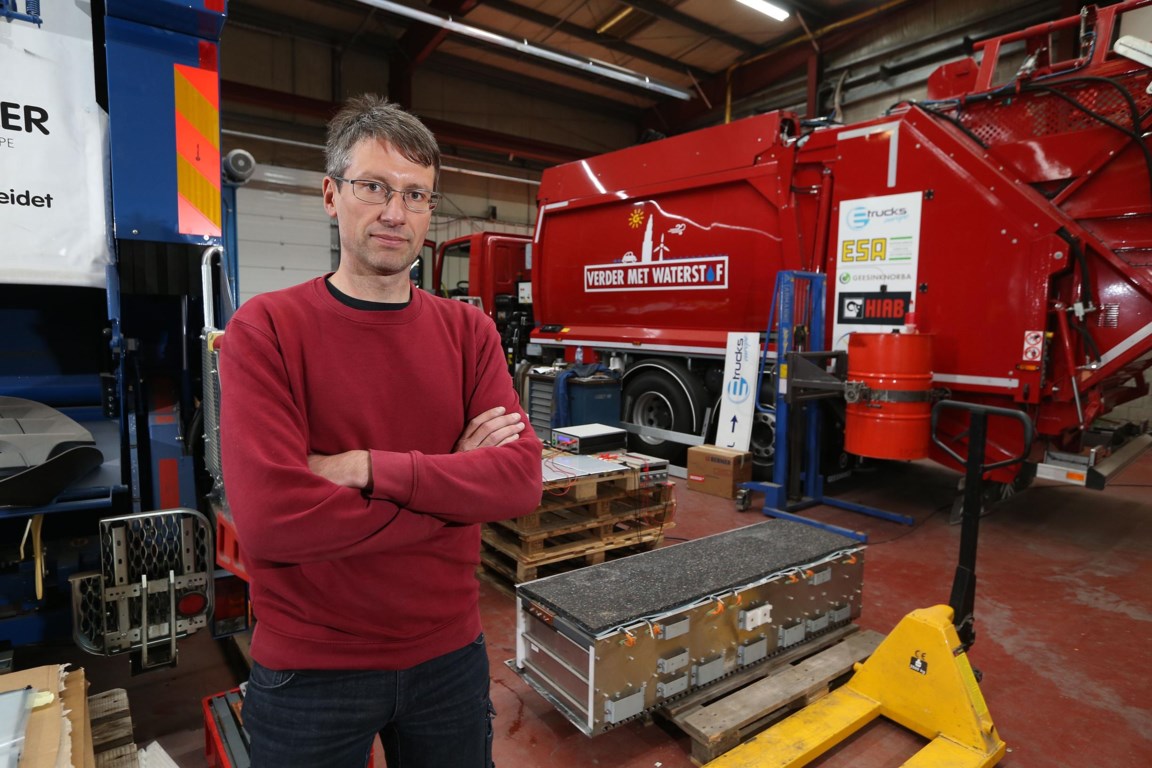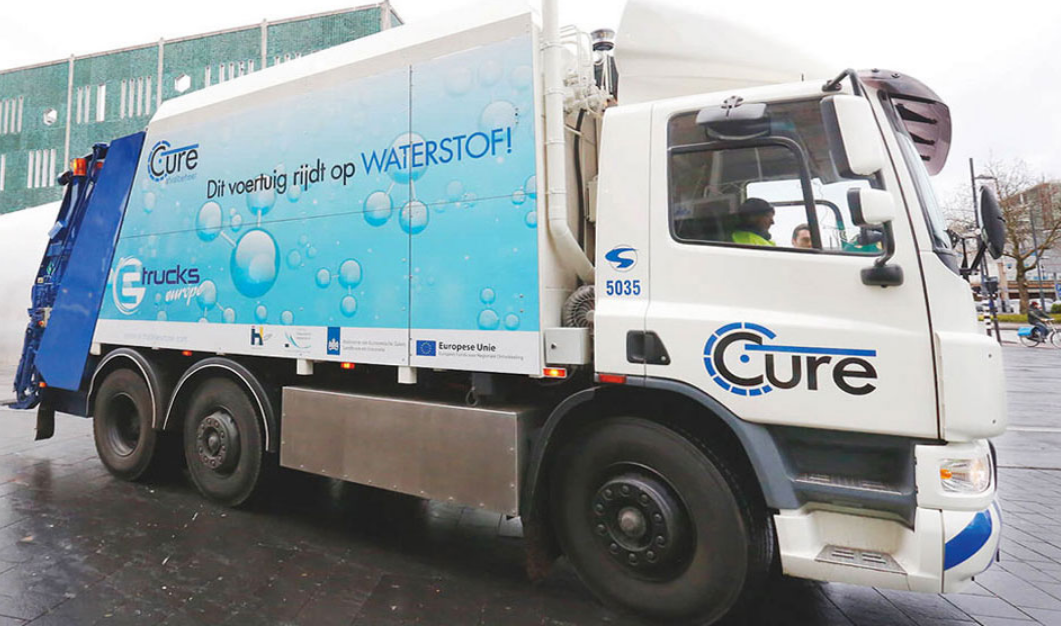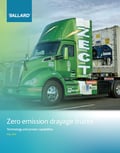This interview is part of our ongoing conversation with innovators in the hydrogen fuel cell mobility sector for heavy-duty applications. We had the opportunity to talk with Flip Bamelis of E-Trucks Europe at their head office in Lommel, Belgium to discuss their projects in development.
E-Trucks Europe is a Belgian manufacturer of industrial vehicles. E-Truck started in 2010 with a mission to develop heavy-duty electrical trucks for in-city applications like garbage collection trucks.

Fuel Cells for Trucks: Interview With Flip Bamelis
Why do hydrogen powered fuel cells make sense for heavy duty trucks?
Because it's impossible to operate such equipment for the whole day with only batteries. The main problem is storing enough energy on board the vehicle to meet its operational requirements. When you run heavy-duty vehicles for more than half a day, you really need something else other than a battery-only solution because battery-only requires a very high mass of batteries, which reduces payload capacity. When we implemented fuel cell system to provide onboard charging of the batteries the problem is solved. You increase available payload and operating range is equivalent to traditional diesel-powered vehicles.
(Related post: Fuel Cell Trucks: Solution to Heavy Duty Transport Emissions?)
Other than garbage collection trucks, what are the right applications today and what do you think are the right applications for tomorrow?
For us, it doesn't matter if it's a garbage truck, container truck or normal logistics truck. For trucks, also in traditional ones, the chassis is different from the superstructure and hence any application can be converted. But at the moment, the technology is still quite expensive when compared to the legacy fossil fuel systems. You have to find a sector where the final goal is not only making financial profits. You have to include in your business model’s elements such as environmental and societal issues and the inherent impact costs of diesel-powered systems. That makes that some applications are more easily to introduce as others.
What do you think about fuel cells and the future?
I think when the technology becomes less expensive, fuel cells will be widely adopted for many applications, in-city use and long distance hauling. It is a good solution. It will be applied in many uses, first in those where the societal profit primes over economical profit, later in the more economical oriented ones. In the long term, it will become the new normal for the heavy-duty sector. But we have to go still a way before we are there.
Can you tell me about your latest fuel cell project?
Here at engineering, our focus has been on mainly the integration of fuel cell mainly in the garbage collection trucks as we the electric conversion is a well known activity by our people at the moment.
You have put some of these garbage collection trucks in service. What is the feedback from the operators and the drivers?
At this moment we are in the first adopters phase of the program. We have a really good relationship with these operators who we have identified as “first adopters.” They are very accepting if some things don’t always go exactly to plan. They know that we are in the development phase and they are also in the middle of making big changes to their mobility infrastructure.
They are very accommodating to our needs because they know of the long-term benefits by partnering with us and testing the system with one or two trucks in their fleet. This allows them to select the most acceptable drivers to drive, observe and report the equipment's performance.
In fact, these first adopters can never be supported and encouraged enough. They take the risks of using equipment, and they are needed in order for the technology to be introduced and further developed.
Is it a productivity issue at this time during this early adoption stage? For example, if you are a garbage collector you have to do your route in a specific amount of time, you've got a number of stops. Are the fuel cell powered trucks meeting their availability targets (or their garbage pickup requirements?)
In a normal diesel truck the systems are well developed and predictable. Operationally, things are going quite well. There is not much failure. That means they can drive a diesel truck for four to five weeks without having any delay of service issue. At this moment the fuel cell is not as reliable because system integration issues are still being fine-tuned. We are still collecting a lot of data. The drivers understand that when there is a service issue caused by the fuel cell battery system, we are going to ask them for a detailed explanation of what happened prior to the failure. On top of a shut down during their normal job, this situation always makes them a little bit nervous. From a system developer's perspective, it's a difficult situation to tackle.
What are the challenges for wider adoption of hydrogen mobility where e-Truck is doing business?
For wider adoption challenges - certainly the price, budgets. The cost of the technology has to go down. We are competing against traditional diesel-powered trucks, completely finished engineering and build at high production rates. A diesel truck manufacturer here in the neighbourhood produces 250 to 260 trucks per day. We are making 10 or 15 trucks per year. It is all about the scale of operations.
That is an enormous gap. You can simply not expect that prices will decrease to the same level when you manufacture with these differences. We will certainly have to upscale. E-Truck is making a new factory where we foresee to manufacture one truck per week. That's 50 per year. Even with our capacity increasing by a factor of four we are still unable to compete with diesel technology in today’s pricing environment without incentives.
We are working hard to develop a business model that can justify the additional cost for zero emission technology, but this requires policymakers to recognize the societal benefits and put incentives in place to accelerate the transition to a zero emission future.
Are policies being adopted in Europe that are going to encourage larger manufacturers to consider zero emission technologies?
Yes. We see cities across Europe implementing programs that promote and even force zero emission transportation solutions while discouraging diesel use. Programs are being adopted countrywide in places like Germany, The Netherlands and Denmark. There are cities, like Amsterdam or London that are stating they do not want to see diesel truck coming into their city centres anymore. It is happening city-by-city, and not so much at the national legislative level.
What would you like to see from the fuel cell industry in order to improve the value proposition of fuel cell heavy-duty vehicles?
One area that would benefit the acceleration of the technology would be for fuel cell supplier to become more closely tied together with integrators. Our experience has been that once you buy a fuel cell, you are then immediately asked to sign a lot of additional contracts with other contributors to develop the comprehensive solution. If you really want to make it happen they need to provide companies, like E-truck, with access to an on-site expert who would be able to get the entire system working.
What is your vision for the future of clean transportation?
After almost nine years in the business I see things accelerating. Initially, there was some interest in heavy duty, but the focus was on personal cars. People are now getting interested in zero emission transportation solutions. They are saying to us, "There is something really exciting with electricity and mobility happening at this moment." These people are coming into us to have meaningful conversations with real budgets. I think we are slowly coming to a point where things are becoming much more serious.
(Related post: Zero Emission Freight Trucks: The Future of Clean Transport)
What do you think we are going to need before we see a large-scale adoption and to make it a reality?
The hydrogen refueling network needs to be developed. Our clients come in and want to implement a zero emission solution for garbage trucks, and then discover that local hydrogen isn't readily available and they need to build a refueling station. When they are putting only one or two trucks in their fleet the costs to build a refueling station makes the solution much more complex and costly to implement. So you would need some other businesses, (or government) to come in and take financial responsibility to build this infrastructure and sell the fuel at a reasonable price.
Next Step:
For more information on the benefits of fuel cell-battery hybrid architecture for drayage trucks, download our white paper below.




 Zero-Emission Drayage Trucks: Technology and Proven Capabilities
Zero-Emission Drayage Trucks: Technology and Proven Capabilities
